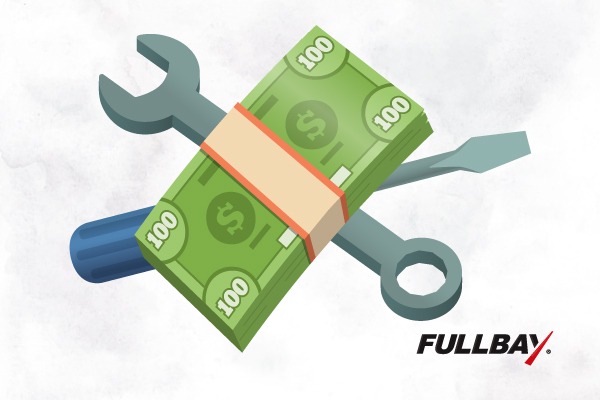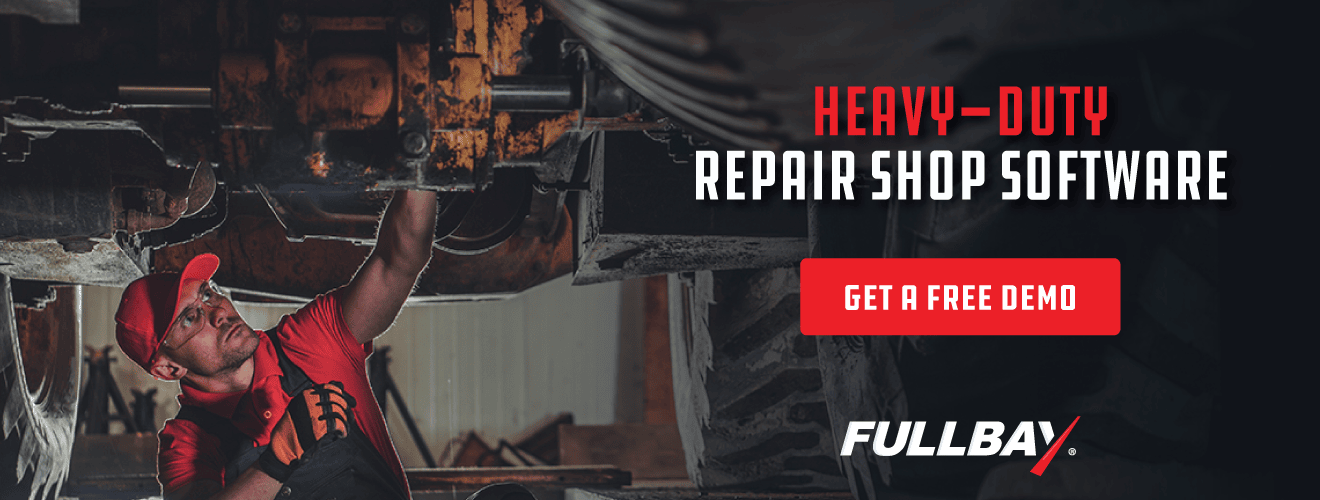5 Things You Should Know About a Heavy Duty Shop Owner’s Salary

It’s not only mechanics and heavy duty techs who open repair shops. Fixing and maintaining semis and other heavy duty vehicles is lucrative for anyone who’s looking to own an affordable business. Of course, an important goal is that your shop is profitable enough to provide you with a paycheck. Some argue that it’s hard to turn a profit in the automotive repair business. However, working in the heavy duty niche is one of the puzzle pieces. Knowing other factors that affect the business fills in the rest of the equation. Armed with the facts, you can budget to pay yourself a respectable if not enviable heavy duty shop owner’s salary.
5 Things That Affect a Heavy Duty Shop Owner’s Salary
1—It’s a Niche That Pays
Average annual salaries for general auto repair shop owners are estimated in the low to mid-$60,000 range. However, experts point out that specializing in certain types of vehicles increases what you can charge for your services. That can increase a heavy duty shop owner’s salary. Naturally, the point isn’t to gouge customers with inflated prices, but not just anyone can service or repair semi-trucks. Therefore, specializing in that type of heavy duty equipment can increase your salary. You could reasonably earn a six-figure salary, doubling a general auto shop owner’s salary and possibly earning much more. Plus, landing work doing the PMs and repairs for entire fleets will increase your shop’s income along with yours, too. (Use our ROI Tool to calculate what you could earn running a diesel repair shop.)
2—Business is Booming
The Internet has caused many retail businesses to close their doors. But the World Wide Web can’t replace a quality heavy duty repair shop. What’s more, there’s not a lot of competition out there on the heavy duty landscape. Shops in dealerships tend to be more expensive, so you can draw customers looking for good service at a reasonable price. As an independent shop owner, you have better control of your overhead costs.

To top it all off, the trucking business is alive and well. Although fewer people are pursuing truck driving as a career, self-driving trucks may be poised to fill the driver shortage. It’s estimated that 81 percent of the freight business’s revenue well into the year 2024 will be earned by trucking fleets. All those trucks will need a shop like yours to perform preventive maintenance and handle repairs when they come up.
3—Things That Eat Your Bottom Line
When it comes to things that affect a heavy duty shop owner’s salary, you need to be aware of all the costs involved in running a repair shop. It’s likely you’ll have some sort of facility cost. That could either be a mortgage to buy your building or a rent or lease payment if you don’t own the space. If you can, steer clear of high-interest loans and inflated rent prices that often come with prime commercial real estate. Also, there’s insurance and the repair industry has a high claim rate historically, so that cost won’t be cheap.
Next, you don’t want to overstock your parts room. However, it’s good to have some parts to have on hand, so customers don’t have to wait for routine jobs to be completed. Plus, you need to market your shop and, while a good marketing plan doesn’t have to cost an arm and a leg, there will be a price tag on some of your marketing efforts.
Possibly most important, there will be labor costs. If you’re a mechanic, you’re probably planning on doing most of the jobs yourself. But you’ll need someone at the front counter in the office taking calls, scheduling repairs, and greeting customers. Whether you’re a tech or not, you’ll likely want to hire on a few technicians anyway to increase your shop’s capability and its profits. In addition to that, there’s the pitfall of downtime. If you don’t make the most of the techs’ time, you’ll be paying them to stand around doing nothing.
4—Other Issues That Could Decrease a Heavy Duty Shop Owner’s Salary
They say you should always expect the unexpected and, in the heavy duty repair game, there can be plenty of unforeseen variables. Vendors raise prices, parts mysteriously disappear, companies that provide services to you could raise their rates, your best techs might quit for other job offers or to start their own shops. Issues like these typically come out of the blue, hitting when everything seems to be going great, and they’ll all affect your profits. In turn, that affects what you can pay yourself for a heavy duty shop owner’s salary.
Poor management is another factor that affects repair shop profitability. It’s worth it, in the long run, to be prepared beforehand so you can run your shop like a well-tuned machine. If you’ve managed any business before, that’s a plus. However, it’s a difficult task for owners who are mechanics with no business experience. Take a class or two, even if they’re online. Talk to someone experienced in managing a business. Any knowledge you can gain going in will help ensure you can keep the doors open and pay yourself a regular salary.
5—Compensating Factors
When starting out, the heavy duty shop owner’s salary your shop can afford might not be as high as you’d like it. But there are some factors that can offset initially taking a lower paycheck. First, if you’re buying an existing business, you should be able to get into it for a relatively low price. The typical cost of a repair shop is around 1.69 times the cash flow, according to Bizcomps. Even if you have to take out a loan for the purchase price, it should still be manageable. You can plan on a raise once it’s paid off in a few years.
Additionally, you can set the hours. Most repair shops are open on weekdays and for limited time on Saturdays, so you should still have time for family and a social life, especially if you use modern shop management software. Even if you decide to work after regular business hours for customer convenience, you could balance that out by opening later in the day.
Optimizing Your Earning Potential
If you want to take home a good heavy duty shop owner’s salary, you need software like Fullbay. It helps you manage a repair shop like an old pro, no matter how much experience you have. Fullbay keeps tabs on inventory, so you can order enough and just in time without overstocking. It schedules jobs to make the most of the talent you’ve hired, and you can use it to create estimates and invoices. It even has features to help you land ongoing work with fleets, like tracking PMs and maintaining vehicle history, kind of like a medical record for trucks. Plus, since you can access it on your smartphone or tablet from practically anywhere, it frees you up from the shop, giving you more time for the other important things in your life. Fullbay is the one tool you need to optimize your overall earning potential.

